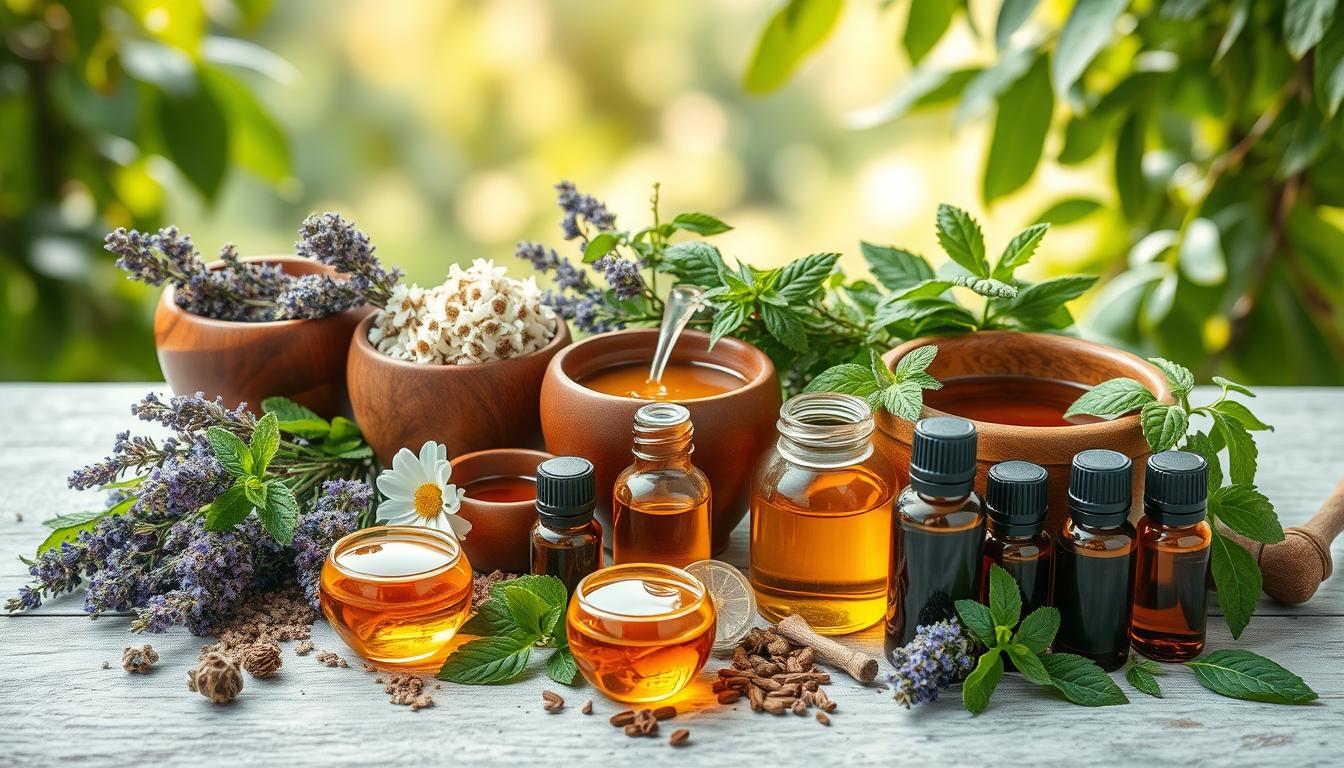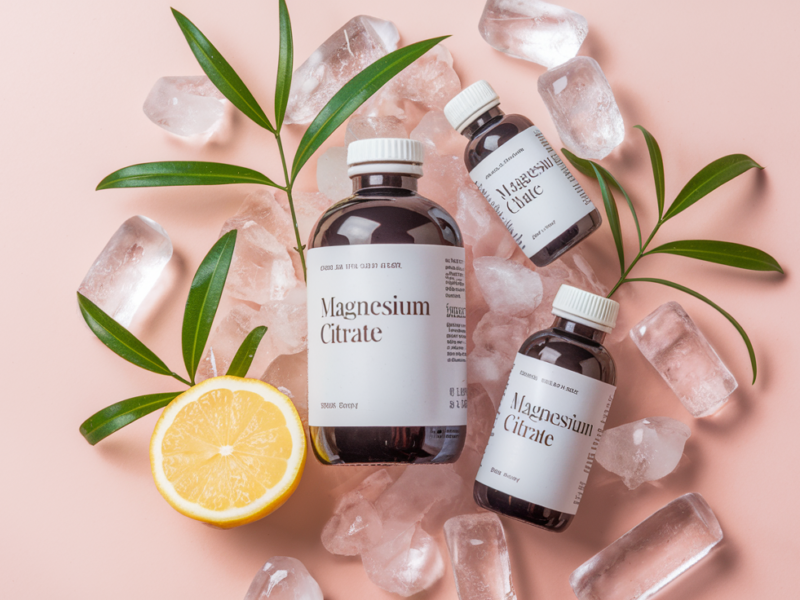Have you ever thought about treating your everyday problems with simple natural remedies? Modern healthcare has its own issues. More people are turning to holistic healing to feel better and stay healthy. Natural treatments are becoming more popular, blending old traditions with new practices.
Home remedies are big in places like rural North Carolina. People are using herbal solutions like elderberry syrup and echinacea to help with common issues. Let’s look into how natural remedies can help you on your path to better health.
Key Takeaways
- Natural remedies, such as elderberry syrup and echinacea, have notable health benefits.
- Holistic healing incorporates ancient traditions and modern practices.
- There’s a significant trend towards combining traditional and alternative medicine in healthcare.
- Home remedies maintain a strong presence in communities with limited access to biomedical care.
- Probiotics and herbal solutions offer effective treatments for common ailments.
The Power of Natural Remedies in Modern Healing
Natural remedies are becoming more popular in today’s health care. People are looking for other ways to heal, because of the problems in our health system. These remedies offer comfort and power, giving people choices that focus on the whole body.
Plants have been used for medicine for thousands of years. Traditional Chinese Medicine and Ayurveda are examples of this. Learning about these old ways helps us see how natural remedies help us today.
Science shows that some natural treatments work well. For example, many cancer drugs come from plants. Elderberry is also popular for boosting the immune system, with sales going up a lot during the COVID-19 pandemic.
Natural remedies are good because they have fewer side effects. People use them to feel better and live healthier. Lavender helps people relax, and ginger helps with stomach problems. These remedies have been used for a long time, showing their value.

More and more people are using traditional and complementary medicine. This includes about 42% of people in the U.S. The World Health Organization is working to set standards for these practices. This shows they are important in health care worldwide.
Looking into natural remedies can help you take care of your health in a meaningful way. By exploring these ancient practices, you can make your wellness journey more balanced and rewarding.
To learn more about the health benefits of natural remedies, like bone broth, read this article on bone broth.
Benefits of Holistic Health Approaches
Holistic health looks at your body, mind, and spirit together. It helps you feel better in many ways. This approach treats the whole person, not just symptoms.
One big plus of holistic health is knowing yourself better. Yoga and meditation help you understand your feelings. They make you feel balanced and strong.
These methods come from old traditions like Ayurveda and Chinese medicine. Now, many people use them with modern medicine. Herbal remedies, massage, and exercise help you feel good and fix health problems.
The table below shows the good things about holistic health:
| Benefit | Description |
|---|---|
| Stress Reduction | Holistic practices make you relax and lower stress. |
| Emotional Balance | Mindfulness makes your mind clear and emotions stable. |
| Pain Management | Therapies like acupuncture and massage ease chronic pain. |
| Improved General Well-being | Integrative methods boost physical health and spiritual growth. |
| Empowerment | Patients help themselves heal, feeling more in control. |
More people are seeing the value in holistic health. They use it with regular medicine. A good plan might include healthy food, relaxation, or creative activities like art or music. These fit with holistic medicine, which treats the cause of problems, not just symptoms.

Understanding Alternative Medicine
Alternative medicine is a wide range of practices not like regular medicine. It includes things like naturopathy, acupuncture, and natural remedies. Many people use these to help their health in a special way.
Unlike regular medicine, which often just treats symptoms, alternative medicine looks at health in a bigger way. It mixes these methods with regular care. This makes a healthcare plan that fits just right for each person.

One great thing about alternative medicine is it believes in the body’s healing power. It says our bodies can heal themselves with the right help. Things like acupuncture and herbal treatments can really help with long-term health problems and make life better.
Here’s a table showing different kinds of alternative medicine:
| Type of Alternative Medicine | Description | Common Uses |
|---|---|---|
| Acupuncture | Involves inserting thin needles into specific points on the body to balance energy. | Pain management, nausea, stress relief |
| Herbal Treatments | Uses plants and plant extracts for healing. | Digestive issues, immunity boosting |
| Naturopathy | Focuses on natural remedies and the body’s healing power. | Chronic illnesses, preventative care |
| Meditation | A way to increase awareness and relax. | Stress management, anxiety reduction |
| Massage Therapy | Works on soft tissues to ease tension and pain. | Muscle pain, relaxation, stress relief |
When you look into alternative medicine, think about how it can help with your health plan. Knowing about these options helps you make smart choices for your health.
Popular Natural Remedies for Everyday Ailments
Adding natural treatments to your daily life is easy and works well. Here are some top home remedies that use nature to fix common problems:
- Turmeric: It fights inflammation, helping with arthritis pain. Eating 1/2 to 1 1/2 teaspoons a day is best.
- Honey: It’s great for sore throats, a better choice than cough medicines.
- Ginger: It helps with nausea, like morning sickness and chemotherapy side effects.
- Peppermint Oil: It eases irritable bowel syndrome, helping with stomach pain and spasms.
- Coconut Oil: It’s good for skin, preventing diaper rash in babies and keeping skin moist.
Looking for specific relief? Some natural treatments target certain issues:
| Ailment | Natural Remedy | Benefits |
|---|---|---|
| Joint Pain | Turmeric | Reduces inflammation well, like anti-inflammatory drugs. |
| Cold Symptoms | Chicken Soup | Helps with cold symptoms and speeds up recovery. |
| Allergies | Saltwater Rinse | Reduces allergy symptoms and might shorten colds. |
Using these home remedies daily can help you control your health. Herbal remedies not only heal but also make you feel better naturally.

The Role of Herbal Remedies in Health
Herbal remedies are a big part of health. They offer a natural way to feel better. Many people use them instead of medicine.
Herbs like chamomile help with digestion. Ginger can reduce swelling. You can find them in pills, powders, teas, and tinctures.
But, herbal remedies are not checked by the FDA like regular medicine. This means we need to know how they work and their risks.
Here’s a table of some common herbal remedies and how they’re used:
| Herb | Traditional Use | Form Available |
|---|---|---|
| Black Cohosh | Menopausal conditions | Pills, teas, tinctures |
| Echinacea | Immune support | Pills, liquid extracts, teas |
| Evening Primrose Oil | Arthritis and PMS symptoms | Capsules, oils |
| St. John’s Wort | Mild to moderate depression | Pills, teas |
Herbal remedies are good for health, but use them carefully. Think about the quality, how they might mix with other medicines, and any side effects. Talking to your doctor is a good idea.
Knowing how herbal remedies work is key. With the right advice, you can use them well in your health plan.
Integrating Home Remedies into Your Wellness Routine
Adding home remedies to your wellness routine can make your health better. Using DIY remedies with regular treatments is good for you. It helps you see health as a whole, caring for your body and mind.
Start with small changes that fit your daily life. Try herbal supplements like St. John’s Wort for mood or chamomile for calm. Exercise also boosts your mood and keeps you on track.
What you eat matters a lot for your health. Eating lots of fruits, veggies, and healthy fats is key. Mindful eating also helps you connect with food better. This lets you use home remedies well.
Make time for yourself by setting limits. Short breaks can stop burnout and clear your mind. Doing hobbies or creative things also helps with stress and happiness.
Listen to your body as you try new things. Everyone is different, and what works for one might not work for another. Using home remedies and traditional treatments together helps you stay healthy in a big way.
Natural Remedies for Stress Relief and Relaxation
In today’s fast world, managing stress is key to feeling good. Natural remedies help with stress relief and fit well with holistic healing. Aromatherapy with lavender oil can make a calm space, easing anxiety.
Herbal teas are great for stress relief. Chamomile tea tastes soothing and can lower stress hormones. Yoga is also helpful, mixing physical and mental exercises for balance.
Mindfulness, like meditation and deep breathing, can calm you down anywhere. Laughter and friends help too, making us feel better when things get tough.
Make your home a calm place for stress relief. Think about these things:
| Element | Details |
|---|---|
| Aromatherapy | Use lavender or chamomile essential oils in a diffuser. |
| Light | Soft lighting can create a relaxing atmosphere. |
| Sounds | Play calming music or nature sounds. |
| Decor | Incorporate plants or calming artwork. |
Writing in a journal helps release feelings. Creative hobbies like gardening or drawing also reduce stress. Eating well, with lots of fruits and veggies, is important for self-care.
If anxiety is hard to handle, therapy like CBT can help. These natural remedies help connect your mind and body, leading to better health.
Utilizing Plant-Based Medicine for Healing
Plant-based medicine is becoming more popular. People like it because it’s natural and can help their health. It’s often used along with regular medicine.
Learning about herbal remedies can help you feel better. Studies show that many plants have special healing powers. This shows how old wisdom can meet new medicine.
Cannabis is being used worldwide for health reasons. It’s not seen as a drug in many places. Ginkgo biloba is known for its anti-inflammatory effects. It has many good compounds in it.
Phytotherapy can help with many health problems. But, be careful not to take too much. This way, you stay safe and get the best results.
Looking around for plants with healing powers can be fun. It can also teach you about old traditions. Here are some well-known herbal remedies:
| Herb | Common Use | Benefits |
|---|---|---|
| Cannabis | Pain relief, anxiety reduction | May help reduce inflammation and alleviate chronic pain |
| Ginkgo Biloba | Memory enhancement | Supports cognitive function, benefits from flavonoids |
| Turmeric | Anti-inflammatory | Contains curcumin, which helps combat inflammation |
| Aloe Vera | Skin care | Soothes burns and skin irritations |
When using natural treatments, know about possible side effects. Make sure to get your herbs from a trusted source. This way, you get the most health benefits with the least risk.
DIY Remedies: Create Your Own Healing Solutions
DIY remedies let you make your own health solutions. Many people choose homemade remedies for skin problems over store-bought ones. About 60% prefer making their own.
Making herbal oils, salves, and creams is rewarding. It takes about one to two weeks. A good mix is three parts carrier oil to one part essential oil. Storing them in a cool, dark place helps them last six months.
When making your own remedies, safety is key. Around 80% do a patch test first. This helps avoid bad reactions. Start with simple recipes using easy-to-find ingredients.
- Lavender Oil Infusion: It helps calm you down and can reduce pain during medical procedures.
- Rosemary Salve: It helps with muscle pain and can improve memory.
- Peppermint Oil Cream: It’s good for skin irritations because of its anti-inflammatory and antimicrobial properties.
Using aloe vera gel is a good idea for skin care. It keeps skin cells moist. Honey and coconut oil are also great for keeping skin soft and moisturized.
Here’s a quick summary of making your own remedies:
| DIY Remedy Type | Use | Average Preparation Time |
|---|---|---|
| Herbal-Infused Oils | Skin Care, Pain Relief | 1-2 weeks |
| Herbal Salves | Muscle Relief, Moisturization | 1-2 weeks |
| Herbal Creams | Anti-inflammatory, Hydration | 1-2 weeks |
DIY health solutions let you make remedies that fit your needs. It’s a fulfilling way to take care of your health.
Conclusion
Using natural remedies and holistic health can really help you feel better. By adding these to your daily life, you can take charge of your health. Studies show that family traditions play a big role in using home remedies.
Learning about herbal remedies and other natural treatments is very helpful. It gives you tools to handle small health issues. It also makes you feel connected to your community.
Trying out home remedies that you like can make you appreciate them more. This makes you more dedicated to living a holistic life.
Think about trying out natural remedies that feel right to you. But also keep using traditional medicine when needed. Mixing these approaches can make your life more fulfilling. It shows that your journey to wellness is about learning and healing.


